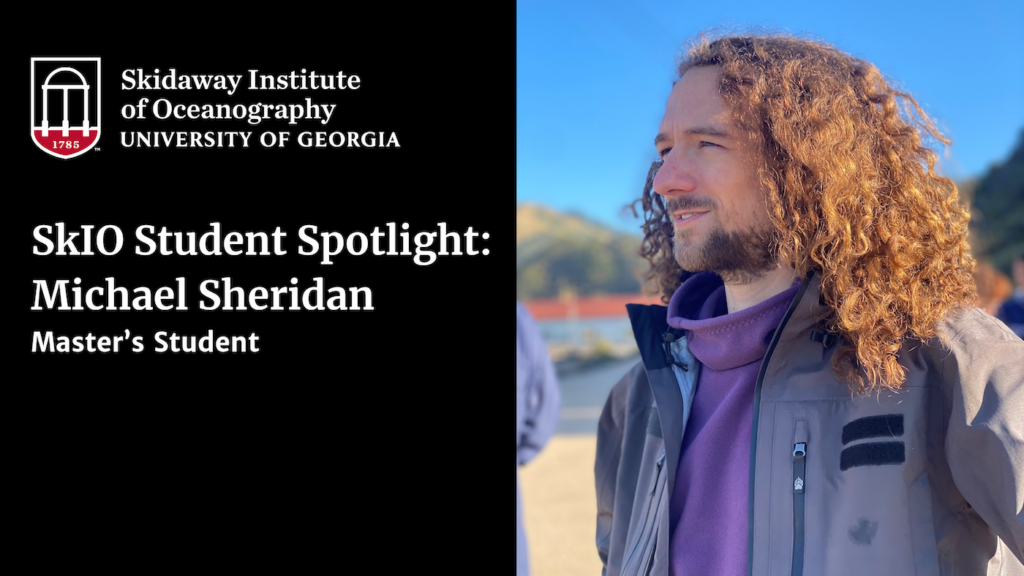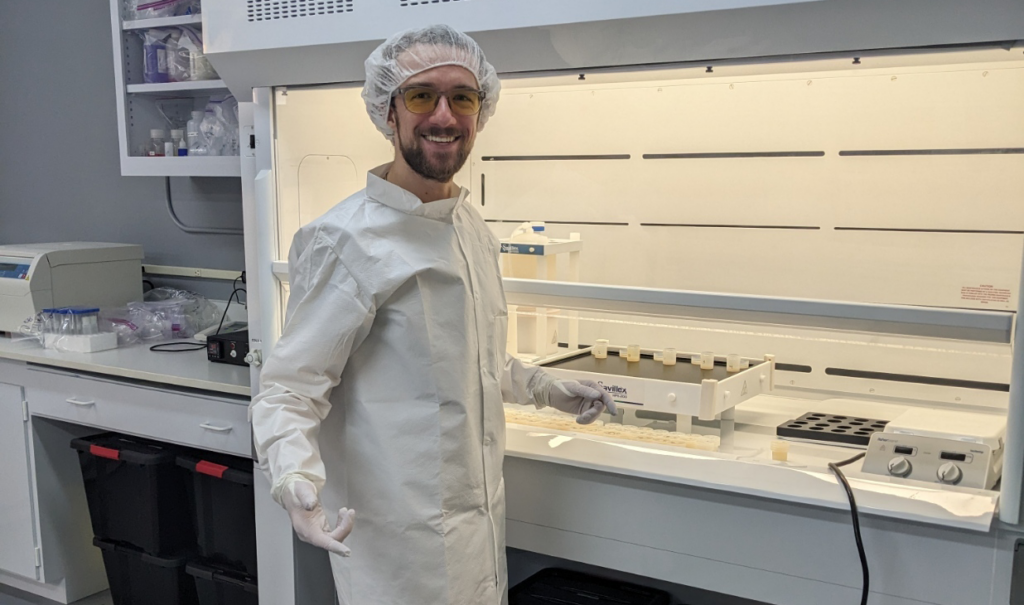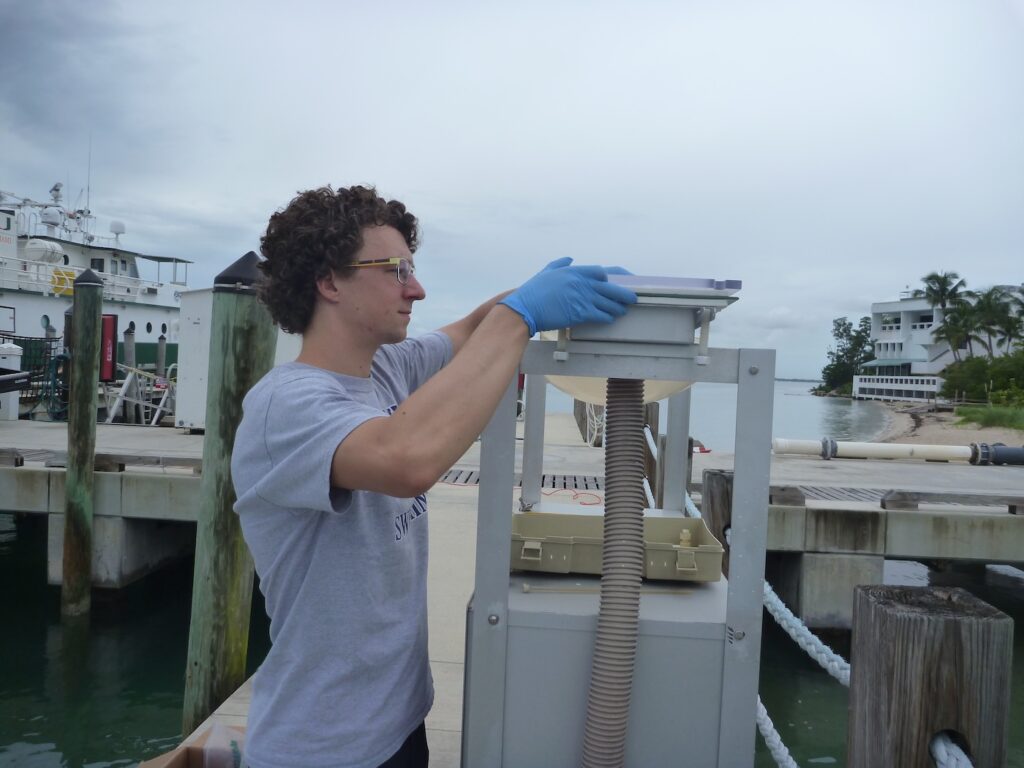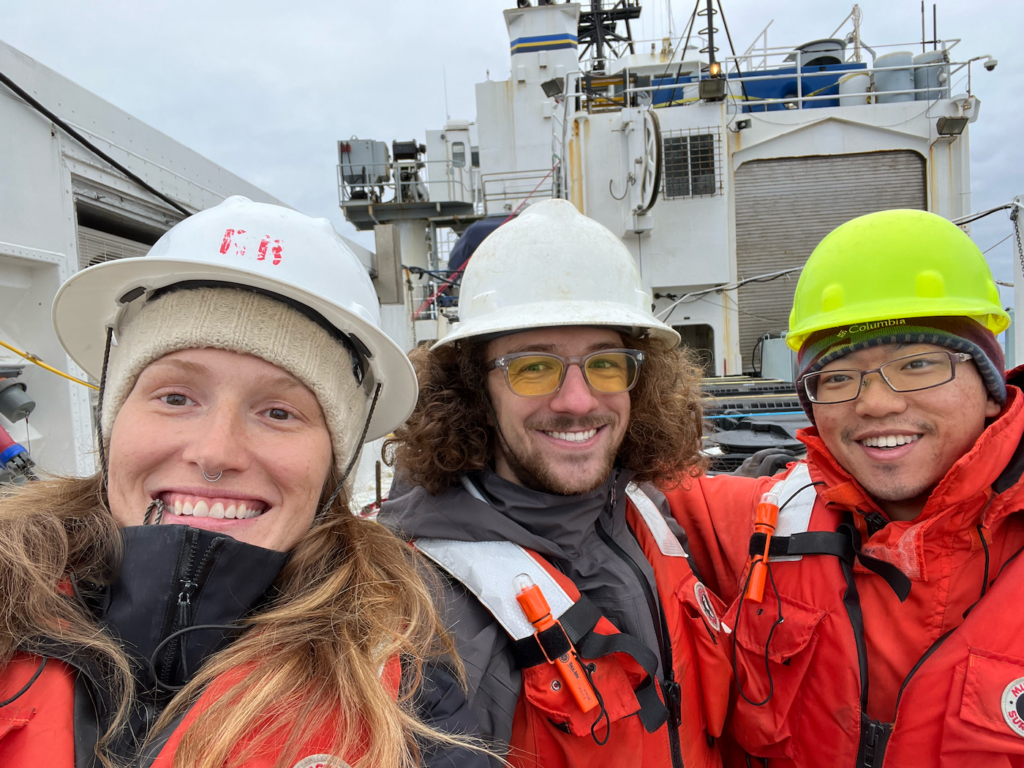
Originally from Northwest Ohio, Michael Sheridan is a master’s student and research assistant in Clifton Buck’s lab at the University of Georgia Skidaway Institute of Oceanography (SkIO). Sheridan received his bachelor’s degree from the University of Miami, where he majored in chemistry and minored in philosophy and management. He has researched particles suspended in Earth’s atmosphere since 2017.
SkIO: What are you studying at SkIO, and who are you working with?
Michael Sheridan (MS): I quantify aerosol trace element concentrations and solubilities for SkIO’s Buck Lab. What does that mean? That means I suck particles from the air above ships traversing the open ocean. Then I dissolve parts of those particles in ultra-pure water and acid. Then I inject that water and acid and the dissolved particle parts they carry into an instrument that measures minute amounts of trace elements. I focus most on the trace element iron because phytoplankton need it for photosynthesis. In regions like the iron-limited Southern Ocean, where many of my samples are from, any source of soluble iron to the surface ocean can spur primary production. And since primary production involves phytoplankton taking up carbon dioxide (CO2), a greenhouse gas that’s warming Earth, everyone from marine microbiologists to climate scientists care about it.

SkIO: What inspired your love of oceanography and, more specifically, your track of study?
MS: I didn’t grow up next to the ocean. I’m from a small town in Northwest Ohio where fields and county roads are the only things stretching past the horizon. But I spent much of my free time swimming competitively and kayaking for fun. I liked the water, and I knew I wanted a good excuse to chase bigger bodies of it. Pursuing oceanography after high school offered that excuse with more educational development and adaptable employability than, say, enlisting in the Navy.
You’ll note I’m training as an oceanographer, but my study subject isn’t the ocean. It’s the aerosols over it. Aerosols first interested me because they’re microscopic, ubiquitous things that connect land, air and ocean, but it was my early research experiences that really inspired me to study aerosols.
During my second undergraduate semester, I started working for Dr. Cassandra Gaston at University of Miami’s Rosenstiel School of Marine, Atmospheric, and Earth Science. Cassie was building her lab when I started, so she would hand me smaller projects or have me help grad students and postdocs with larger ones. Because I had so much enthusiasm, I just ran with them in the intentional, detailed and directed way I run with most things. I was committed, effective and surrounded by wonderful people with exceptional mentoring skills. That really made the experience, and my passion for aerosols, stick. It stuck so much that I spent five years swapping filters atop sampling towers, capturing algal toxins along coastal canals, bursting bubbles into fruit fly faces, dissolving desert dust in deadly acids, and more. That’s what really inspired me — exceptional research experiences.

SkIO: Why did you choose SkIO?
MS: Signing with SkIO’s Buck Lab guaranteed me ship time, trace-metal clean technique training, and a lab culture encouraging autonomous productivity. That’s always what I look for — a work environment where I can apply my strengths and existing skills to projects offering professional and technical growth.
Our campus here on Skidaway Island was also a big draw for me. It’s picturesque, peaceful and a good place for methodical graduate work.
SkIO: Describe a typical day in your life at SkIO.
MS: I spend a surprising amount of time at my desk studying concepts, solving problems, planning workflows, reviewing data, reflecting on procedures and writing about science. Some people don’t realize how much conceptual work and organization goes into and comes after research execution. I break up my deskwork with manual responsibilities like cleaning plasticware or distilling acid, but the most active part of my research, collecting and processing my samples, is complete. I did that part during and shortly after the austral summer of 2022-23. You can read more about it here.

SkIO: What do you do for fun, outside of your work/studies?
MS: I like to keep active outdoors. I just got back from backpacking Point Reyes National Seashore. During a normal week, I’ll swim and run, but not as regularly as I did when I was a proper athlete. Sometimes a Spartan Race or an open water swim will motivate me to train more.
SkIO: What advice would you give a high school or undergraduate student interested in a similar track? How can they get to where you are?
MS: Touch what you think you want to study. Scientific research is an active process. There are people doing research around you, and most researchers really appreciate enthusiastic and engaged help. Talk to professors and graduate students about their research. Identify introductory research opportunities around you, and make time for one. Get your hands dirty. Hands-on research experiences will build your skillset, test your interests, and make you familiar with the research community.


